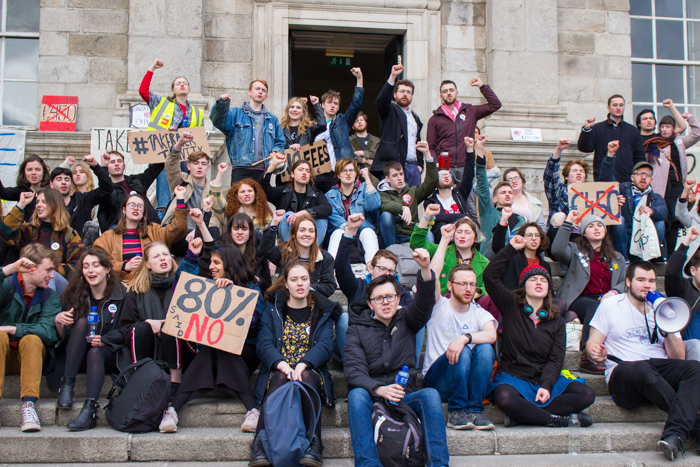It’s been a momentous week for activism in Trinity. Last week, in the first direct action taken on campus for nearly a decade, students demonstrated their opposition to supplemental fees by blockading Front Arch and the entrance to the Book of Kells.
These protests certainly set a promising precedent. But today, students have exceeded all expectations.
Knee-jerk anger in the wake of unpopular news rarely lasts. Whether the level of determination seen last week could be sustained was a hard one to call. But the scale and energy of today’s occupation of the Dining Hall, as well as the forced closure of Front Arch, Book of Kells, and the Nassau St gates, should really have the College quaking in its boots.
Not only are the core team of demonstrators showing immense commitment to the cause – at a time when many students have imminent exams and assignments to think about – they’re also very successfully spreading discontent and cultivating an atmosphere of resistance on campus. And, by exhibiting themselves so publicly, they’ve managed to cause a splash far beyond the College gates.
Today’s events have been picked up by national media. Politicians and other public figures were invited to speak on the steps of the Dining Hall, while others, from the Labour Party’s Aodhán Ó Ríordáin to Catherine Martin of the Green Party, have publicly pledged their support for the protesters. The Trinity branch of trade union Unite is also standing in solidarity with students.
But the scale and energy of today’s occupation of the Dining Hall, as well as the forced closure of Front Arch, Book of Kells, and the Nassau St gates, should really have the College quaking in their boots
Students, tourists, and other visitors to the College couldn’t avoid the chanting and noisy calls to actions of the demonstrators, which continued for most of the day. Walking through campus, many people were rapt by the spectacle and recorded the demo on their phones.
This looks very bad for the College. In general, the strategies taken so far by students have been clever, from the disruptive nature of the direct action to the trolling of Trinity’s social media pages.
Hitting Trinity where it hurts – its tourism and international status – is doubly effective. Not only does it target some of the College’s most precious assets, it also highlights to the wider College population the problem at the crux of the matter: the College’s fixation on commercialisation at all costs. It’s this that should help to mobilise students on a long-term basis, epitomising as it does a university that does not have its students’ best interests at heart.
Speaking at the Dining Hall today, TD Richard Boyd Barrett said: “To my mind, this not just a fight against fee increases. There should be no price tag at all.” Indeed, in just a short few days, the movement has advanced far beyond mere opposition to supplemental fees, with the bigger picture clearly at the fore of students’ minds.
The College has, in recent years, claimed to care about issues like inclusivity, mental health and lowering dropout rates. But charging €450 for a supplemental exam really flies in the face of these alleged values.
Overall, these recent moves made by the College reflect antiquated ideals wherein education is the reserve of the elite and privileged. But people have fought for a very long time to make education more accessible for all and, funding crisis or not, there is no reason to take backward steps on this hard-earned progress. No matter how much you sympathise with the College’s position, there is no excuse for this, and students have no reason to settle for less.
But people have fought for a very long time to make education more accessible for all and, funding crisis or not, there is no reason to take backward steps on this hard-earned progress
Students need to remain aware of tactics on the College’s part. Even in the event that they concede and, for example, lower the cost of the supplemental fee, the fact is that most students voted against them all together. A €450 fee is outrageous, but nobody wanted these to begin with. And, as everyone knows, the introduction of any new fee essentially guarantees that the cost will creep even higher over time. Therefore any new costs directed towards students should be opposed on all counts.
Already the College has relented on the increase of accommodation costs, even though attempting to do so in the first place, particularly in the immediate wake of the announcement of supplemental fees, was ridiculous. The College has also insisted that the excessive supplemental costs are, in fact, part of a fair deal for students because they will enable the introduction of modular billing. This is purposely misleading to those unaware that no supplemental fees and modular billing aren’t actually mutually exclusive.
Students cannot continue to stand by while the College slowly makes small increases year on year, making attending college simply unaffordable for many. Trinity has already been raising postgraduate fees annually for the past five years. Making changes at this slow pace has been a cunning move, as it didn’t give people a salient opportunity to respond with drastic action. Luckily, students have now seized their chance to retaliate.
Of course, the road ahead is still uncertain. It’s undeniable that summer is creeping on, and students will soon be sitting exams and abandoning campus, while many of the Trinity College Dublin Students’ Union (TCDSU) leaders heading up the protests will soon see a changeover in their roles.
But at this point, the student population simply cannot afford to fall back into complacency. When faced with an institution as powerful as Trinity, it can be difficult for students to make their voices heard. But this last week, they’ve managed to do just that, and that means backing down is no longer an option.







